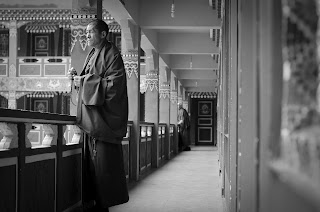I was gone just 3 weeks, but I lived a lifetime during those 3 weeks and returned home with peacefulness rooting from the center of my core. My days were filled with getting reacquainted with old friends, meeting new friends, monasteries, Tibetan farmhouses, monks, festivals, children, hard work, and momos. Returning to Tibet feels like coming home. Yet, being in Tibet is a paradox. It is the most spiritual of all places, but the fear of oppression is palpable...
I didn’t need to speak Mandarin to understand the cab driver was belittling my friend in the front seat, who had quickly become like a sister to me. Outrage began to rise through me, but I resisted the urge to step in and say something. I sat silently, not because I couldn’t speak the language; I was confident I could convey my indignation with just the tone of my voice. Instead, I sat silently because the law was not on our side. I felt like I was bound and gagged in the backseat. Confronting the cab driver would only create problems for my friend.
She looked over her shoulder with an apologetic expression and explained, the driver took us to the wrong destination and insisted it was her mistake. First he told her, “you minorities shouldn’t take cabs...you should get out and catch the bus because you don’t have the money to pay for this,” insinuating my friend was trying to manipulate the driver to avoid paying for the cab ride. After speaking with the person working at the front desk of our hotel, who gave him the same directions as did my friend, the driver said, “it’s your tones...you don’t speak clearly enough. I couldn’t understand you.” In the same breath he insisted she would have to pay the full fare, more than double the rate it would have otherwise cost because it was her fault he got lost.
 |
| It is estimated that one million Tibetans have died as a result of the Chinese occupation, through imprisonment, torture and executions. |
When we arrived at or hotel, we got out of the taxi and my friend paid the driver. I offered to cover the fare, but she wouldn’t allow this, explaining she would get reimbursed by the NGO that employs her. I was frustrated and uncomfortable with my inherent helplessness. I am not accustomed to being a bystander when witnessing racism. I asked my friend how she copes with being passive and silent while encountering prejudice daily. I was trying to understand another way. My friend surprised me by saying, “this makes me so angry.” I had not previously heard my Tibetan friends discuss their anger. They all seem so good at letting go of attachment, I just assumed they had mastered not feeling angry. My friend explained that in spite of her anger, she finds compassion for the Chinese cab driver because reacting to him will not create change, particularly in China’s political climate.
 |
She went on to tell me a story from her childhood about her mother, who she described as “hot headed.” Her mother was gathering water in a bucket when a Chinese man walked by kicked the bucket over. Her mother was so angered by this, she went to his home and confronted the man in front of his family. The man called the police and she was arrested. My friend learned at an early age the consequences of standing up for her rights in China. She admitted she doesn’t want to stay “here,” in Chengdu. She would rather return to her home in Lhasa to be with her mother; in a place that feels more welcoming, but for now she says she is gaining experience.
My friend has travelled a great distance for this "experience." She walked across the Himalayas at age 8 to get an education in India. She went back to Tibet by walking across the Himalayas again at 18, and she was locked up after getting caught crossing the boarder home. Yet along the way she did not lose her Tibetan heart.
|
“It is lack of love for ourselves that inhibits our compassion toward others. If we make friends with ourselves, then there is no obstacle to opening our hearts and minds to others.”























